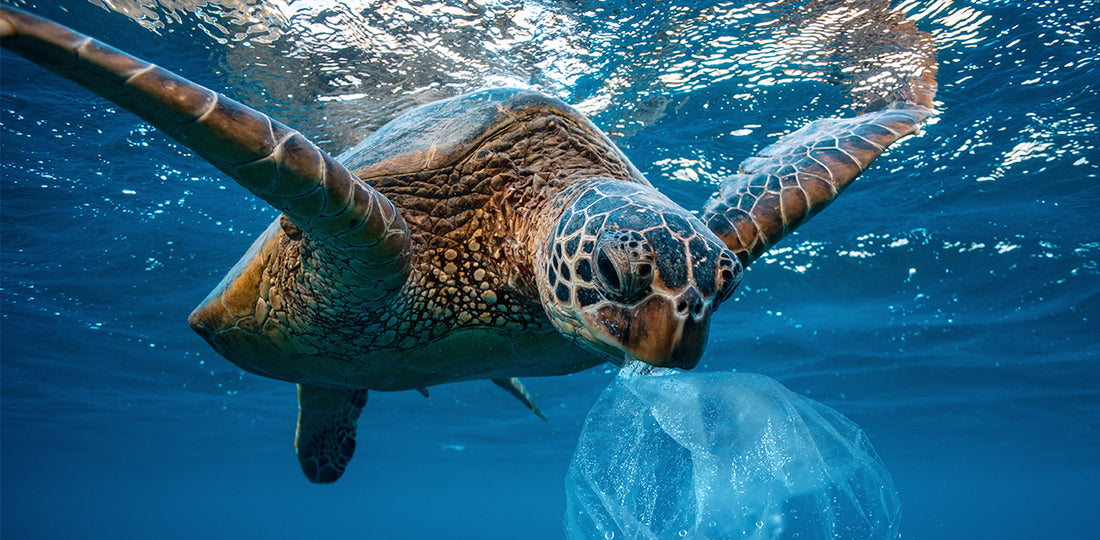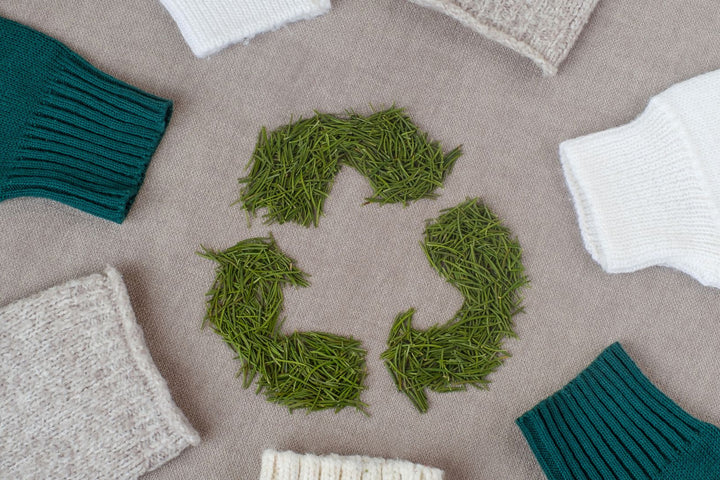
Written by Selisha Griffiths
9 Ways To Cut Down On Your Plastic Consumption
Plastic is one of the few materials on this Earth that I would rather not have been invented. Sure, we have low cost packaging and a convenience but to be honest, with the rate that our plastic consumption has been going over the last 70 years, I would rather live in a world without it. I know a fair few of you are also thinking the same thing, what with climate change reaching an all time high, man-made islands of rubbish floating in our oceans and almost every animal (including us) consuming microplastics.
At THTC we try and minimise the amount of plastic we use on a daily basis, whether that be choosing biodegradable packaging to send orders or the type of ink we use on our t-shirts. We all have the choice to reduce plastic consumption within our own lives and make conscious choices to switch with alternatives.
Today we’re going to talk about how we can reduce our own plastic consumption for beginners. Some of you may already be doing these steps, and if you are, please reach out to us to let us know how you’re getting on, or if you want to try to reduce down, please continue reading.

On average, 16 BILLION coffee cups are used each year. In the vast majority of disposable cups, there is a plastic film inside which prevents it from being recycled. Humans also buy around 1 million plastic bottles per minute worldwide, and less than 50% of them are recycled. By switching to a reusable water bottle, you personally could save 156 single use plastics a year from the fate of being eaten by sea birds and fish, and polluting the ocean with toxic chemicals and micro plastics.
So why wait, pick out a trendy bottle from any shop online that is BPA free, maybe made out of recycled metal and don’t bottle it!

Plastic straws are too small to be conventionally recycled so around 4.4 billion straws are thrown away annually in the UK alone, and while some companies are trying to change over to paper, we can all do our part to refuse a plastic straw in coffee shops, restaurants and more. If you really want a straw, have a look online and you’ll find thousands of alternatives, I have a foldable metal straw that sits in a little case that I have on my keys and it’s genuinely my favourite purchase that helps save the planet. (Plus when it unfolds it looks really cool!)

Single use plastics and plastic bags are freely interchangeable terms, these days. In the UK we have a carrier bag charge of 5p to try and encourage people to bring a bag for reuse.
5 TRILLION single use carrier bags a year are used world wide, and only 1% are recycled. So, what can be done? Well, we can reuse our bags (the reuse part in reduce reuse and recycle), or why not look into a trendy tote bag for all your needs.

The answer will always be to soap, but how you soap is important, these days we are conditioned (see what I did there?) into buying toiletries that come pretty much exclusively in plastic packaging. But there is good news, you now have so many more options when it comes to getting clean. We can now buy shampoo bars, hemp soap and so much more. Please don’t just throw all your toiletries away, but when you next go to purchase some soap, why not take a gander at the many sites offering plastic free alternatives. Or, if you’re feeling really adventurous, why not try and make your own, it’s super easy and you know exactly what’s in it.
For shampoo and conditioner, I know there’s a few that swear by the ‘no-poo’ method where you let your hair clean itself and only rinse with water. For those of us not quite there yet, you can purchase shampoo bars at retailers such as Lush, Planet Organic and a quick google can show many many options for all of us needing a great alternative to these little plastic bottles. Not only that, but shampoo and conditioner bars can last up to 75 washes per bar! Save money by saving the planet!

Glitter is one of those things that never seem to disappear, not only at home but also when you dispose it. From glitter pens and glitter-covered stationary all the way to glitter pigment makeup and semi-ironic quotes on pretty much everything about how glitter is a girl’s best friend.
Where glitter is so small it cannot be recycled, and thus ends up in our oceans, most of the time. Plastic can take up to 1000 years to degrade - so, our options are really biodegradable glitter or no glitter at all. Biodegradable glitter can take around 2-3 months to degrade naturally which is still a bit of a long time, but nowhere near as awful as the hundreds of years glitter generally takes to degrade.

Why buy a pack of fruit or veg in plastic packaging when you can buy the same thing, cheaper without the packaging at all. I didn’t really realise just how much we rely on plastic in our food packaging until I started looking for food that didn’t come in any. It’s honestly pretty hard to find places that don’t only sell food in plastic packages, but there are some, AND many more retailers are opening up to the idea. In the UK, M&S is now selling loose fruit and veg in their pledge to cut down their plastic use, which could save them 580 tonnes of plastic waste in just 2 years. Alternatively, you can always pop to the local market and get a great deal on apples and pears, or even to a farm shop and support your local farmers directly whilst cutting out the supermarket middle man.
If you’re not able to get down to your farms or if M&S is a bit of a stretch to your budget, you can always bring your own containers to your local supermarket or whole foods or wherever you like to shop. I know a fair few people that take their own containers to the butchers and bakers to ensure that they aren’t contributing to the waste of food packaging.

Glass containers are on the rise. Not only can you recycle them, but they also make for cute little dishes for around the home. I used to be obsessed with GU cheesecakes (sadly not a plug) in their glass containers, and ended up washing them out and putting trinkets in or using them as a portable water bowl for my puppies. My current fad is Purdeys drinks and I’ve been collecting the glass bottles to use as mini flower vases where I can put one or two flowers in and dot them around the house. Glass is a great material to reuse around the home as an inexpensive way to spruce up your interiors.
Also, you have to admit that drinking or eating out of a glass container does make your food taste slightly better and healthier. So why not switch to glass coffee container when you buy your caffeine fix or a glass jar of honey?

Makeup wipes and baby wipes can’t be recycled, composted flushed (even if their packaging says otherwise). A large amount of this is due to the synthetic fibres found in their composition, and the harsh chemicals that are found in them. Between 2013 and 2014 the Marine Conservation Society discovered a 50% increase in wet wipes littering UK beaches. Wet wipes are fatal for marine animals, with the non-biodegradable synthetic plastic settling in stomachs and leading to starvation.
There are lots of alternative options to makeup wipes, and wet wipes for both cosmetics and cleaning products. Cleaning alternatives include using compostable and reusable wipes whilst cosmetic alternatives can include using a muslin cloth, using reusable wipes and using a cleanser that has less harsh chemicals in it. The average makeup wipe has plenty of harsh chemicals that shouldn’t actually go on your skin. Companies get away with it by adding a pleasant scent and adding buzz words like ‘gentle’ and ‘sensitive’ but in reality these words mean very little to a large corporation dominating the world. Ditch the wipes, and switch to something that is not only better for the environment but also better for your wallet. Muslin cloths and a good cleanser are honestly my favourite thing to use to remove makeup, they keep their softness, I don’t have to buy more and more of them every month and I know that I’m using something that is meant to be on my skin.

Trash/ Rubbish bags are generally not biodegradable and despite the fact that we are putting rubbish into landfills to try and get them to degrade into the earth, they don’t even make it to the earth because plastic bags take up to 1000 years to degrade. Therefore we’re not even able to let things like our food waste degrade naturally into the earth because it’s stopped by the plastic in trash bags. But, all is not lost! There are other options - we can get compostable and biodegradable bin liners and many UK councils are offering these as their solutions to an overflowing rubbish crisis. Just be aware that biodegradable and degradable are different things, and simply being degradable means that there are chemicals inside the plastic to allow it to break down into smaller pieces but it doesn’t do anything with the plastic. Meaning, that although the bags are broken up, they’re still there, and still doing harm into our environment.
In the UK, the accountability for this can sometimes lie with your local council if they provide bin bags so if this is something you want to change but worry that you can’t due to having preset bin liners, start a petition online, send a letter to your mp and head of councils. Alternatively, look for biodegradable bin bags and the amount of waste that goes in them, and see what you can do to reduce this by donating to charity shops and making sure perishables are used up. If we don’t tell the world that we have a problem with it, how will it ever know how to change?



